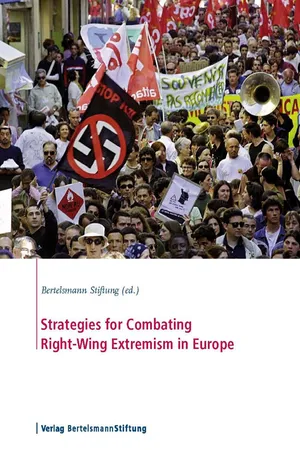![]()
The Authors
Prof. Dr. József Bayer is the director of the Institute for Political Sciences at the Hungarian Academy of Sciences and professor of political science and philosophy at the King Sigismund University College in Budapest. He has studied philosophy and cultural studies at the Eötvös Loránd University (ELTE) in Budapest and at the University of Debrecen. His major research interests are globalization and political transformations, political ideas and ideologies, and international relations theory.
Prof. Dr. Jean-Yves Camus is an associate researcher at the Institut de Relations Internationales et Stratégiques (IRIS) and a professor at the Institut Universitaire d’Études Juives (IUEJ) in Paris. He has a degree in public administration from the Institut d’Etudes Politiques de Paris and graduated with a degree in history from the Ecole des Hautes Études en Sciences Sociales (EHESS). He is a specialist on extremist movements in politics, ethnic conflicts in Europe, racism and anti-Semitism. Among his publications is Front National. Eine Gefahr für die französische Demokratie? (Bonn, 1998).
Dr. Christopher T. Husbands is a reader in sociology at the London School of Economics and Political Science. He obtained his doctorate from the University of Chicago, where he specialized in political sociology. His doctoral dissertation was on the political movement of George C. Wallace in the United States between 1964 and 1968. He has subsequently published on the extreme right in most countries of Western Europe, particularly Belgium, the former German Democratic Republic, the Federal Republic of Germany, France, Great Britain, Italy, the Netherlands and Switzerland.
Dr. Orkan Kösemen is a project manager at the Bertelsmann Stiftung in Germany. He holds a doctorate in social sciences (political science), which he obtained at the Humboldt University Berlin, where he was also a lecturer on domestic German politics. His areas of research include European Union enlargement, institutional change, the politics of Central-Eastern Europe, the European radical right, integration policies and immigrant associations.
dp n="559" folio="566" ?Dr. Heléne Lööw is an associate professor in the Department of History at Uppsala University in Sweden. She holds a doctorate in history, and her main fields of research are National Socialism, right-wing extremism, white-power movements, hate crimes and state responses.
Susi Meret, M. A., is a historian and doctoral student at the Institute of History and International Social Studies at the University of Aalborg, Denmark, as well as a member of the Academy of Migration Studies in Denmark (AMID). Her main research fields include the comparative study of radical right-wing ideologies, electorates in Denmark and Europe, majority attitudes toward ethnic minorities and migration policies in a European comparative perspective.
Prof. Dr. Michael Minkenberg holds the current Max Weber Chair for German and European Studies at New York University. He received his M. A. in American Government from Georgetown University and his Ph.D. in Political Science from the University of Heidelberg. He has taught comparative politics at the universities of Göttingen and Heidelberg, at Cornell University and, most recently, at the European University Viadrina in Frankfurt (Oder). His research interests include the radical right in liberal democracies; immigration, nationalism and the politics of citizenship. Among his book publications are; Die neue radikale Rechte im Vergleich. USA, Frankreich, Deutschland (1998) and Radikale Rechte und Fremdenfeindlichkeit in Deutschland und Polen (2006, edited with D. Sucker and A. Wenninger).
Prof. Dr. Anton Pelinka has been a professor of nationalism studies and political science at the Central European University in Budapest since 2006. From 1975 to 2006, he was professor of political science at the University of Innsbruck. He obtained his doctorate in law at the University of Vienna and his postdoctoral lecture qualification in political science at the University of Salzburg. His main research interests (and publications) are: comparative politics (e.g., Democracy Indian Style: Subhas Chandra Bose and the Creation of India’s Political Culture, 2003); democratic theory (e. g., Politics of the Lesser Evil: Leadership, Democracy, and Jaruzelski’s Poland, 1999); and Austrian politics (e.g., Austria: Out of the Shadow of the Past, 1998; The Haider Phenomenon in Austria; co-edited with Ruth Wodak, 2002).
Britta Schellenberg, M. A., works as research analyst at the Center for Applied Policy Research (CAP) at the Ludwig Maximilian University of Munich. She has studied philosophy and Jewish history in Heidelberg, London and Berlin. Her main fields of research and responsibility are: right-wing radicalism and strategies against it; xenophobia; anti-Semitism; migration; and education policies. She also trains journalists on right-wing extremism. Among her publications is: Zum Umgang mit Rechtsextremismus in den Medien. Analyse und Empfehlungen. In Die Welt zu Gast bei wem? Rechtsextremismus, Fremdenfeindlichkeit und Migration in Sachsen, Deutschland und Europa, edited by Lothar Stock, Carina Tausch und Rainer Vor. Münster: Lit Verlag 2 2008. 173-186.
Dr. Damir Skenderovic is a lecturer in contemporary history at the University of Fribourg and co-director of the Swiss National Science Foundation’s (SNSF) research project “Language and Identity Politics.” He has studied history, social anthropology and communication sciences, and he has been a visiting scholar at the Center for European Studies at New York University. Among his recent books are Mit dem Fremden politisieren: Rechtspopulismus und Migrationspolitik in der Schweiz seit den 1960er Jahren (Zurich, 2008; with Gianni D’Amato); 1968-Revolution und Gegenrevolution: Neue Linke und Neue Rechte in Frankreich, der BRD und der Schweiz (Basel, 2008; co-edited with Christina Späti); and The Radical Right in Switzerland: Continuity and Change, 1945-2000 (Oxford and New York, in print, 2009).
Vera Sperisen, M.A., studied history, sociology and anthropology at the University of Bern, Switzerland. She is currently a research assistant at the University of Applied Sciences in Aarau, Switzerland. Her main research area...
